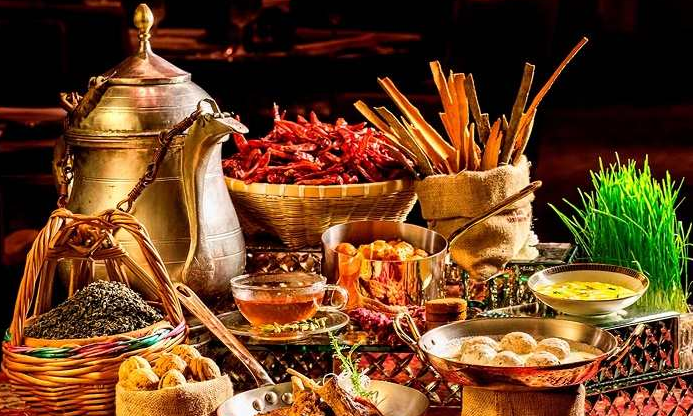HEALTH & WELLNESS
In every Kashmiri home, food has always been more than sustenance—it is memory, ritual, and identity. Traditional dishes like haakh, nadru yakhni, rista, and rogan josh were once cooked slowly over firewood, allowing the ingredients to release their essence, and the food to heal and nourish the body.
Breads such as girda, tchot, and lawasa were baked in local bakery shops (kandur), kneaded by hand, fermented naturally, and baked on hot clay walls. Rice, or batta, the staple of our meals, was boiled in open vessels, the starch-rich water (kanz) drained out to make it lighter on the stomach.
Today, the same foods are still eaten, but they no longer nourish us the way they used to. Why? The answer lies in how we cook them. The rush of modern life has introduced an array of kitchen gadgets—microwaves, rice cookers, air fryers, deep fryers, pressure cookers, non-stick pans, electric kettles, and more. These have certainly made life easier, but they have also stripped our food of its vitality.
Take rice, for example. Cooked in an electric rice cooker, it often becomes overly sticky or soft. Unlike traditional methods where excess starch is drained, rice cooked in closed, electric pots retains the starch, making it heavier to digest and increasing its glycemic index. Over time, this contributes to blood sugar imbalances, weight gain, and sluggish digestion.
Then there’s the pressure cooker, used now for almost everything from rajma to yakhni. While it saves time, it also destroys heat-sensitive vitamins such as B1 and C. The slow infusion of spices in a traditional mutton yakhni, for instance, not only gave it flavor but made the dish calming and digestive. Cooked under pressure, the same dish may lack aroma, feel heavy, and lose its gut-soothing properties.
The microwave is another staple in modern kitchens. Leftover haakh or nadru is often reheated in microwaves in plastic containers. The uneven heating and release of chemicals like BPA from plastics can alter the food’s molecular composition. Such food may fill the stomach, but it no longer benefits the body. Worse, it can be mildly toxic over time, especially when consumed repeatedly.
Bread too has changed. Girda, once fermented with natural cultures and baked slowly in a tandoor, is now often made using baking soda or instant yeast for quick rising. These shortcuts eliminate the fermentation process that helps in pre-digesting the flour and boosting gut bacteria. Commercial maida used in bakeries today lacks fiber and nutrients, increasing the risk of constipation, bloating, and blood sugar spikes.
Even our tea culture has suffered. Noon chai, once lovingly brewed in a samavar for over an hour with baking soda and salt, is now made hastily using tea kettles or even reheated multiple times. The tea, instead of being antioxidant-rich and soothing, turns acidic and irritating to the stomach. Similarly, drinking water from geysers—a practice becoming common in winters—can be risky, as these appliances often contain metal residues and stale water, not suitable for consumption.
Air fryers and deep fryers present another concern. While air fryers claim to be a healthier alternative to deep frying, they heat food at extremely high temperatures, which can lead to the formation of acrylamides, especially in starchy foods like potato chips, bread cutlets, and kebabs. These compounds are potentially carcinogenic. Deep frying in reused oils—common in homes and markets—produces harmful trans fats that damage the heart and increase inflammation.
Then comes the problem of non-stick cookware. Though convenient, most non-stick pans release toxic fumes and particles when overheated or scratched. Cooking omelets, shallow frying paneer, or even preparing rogan josh in such vessels introduces unwanted toxins into the food, silently damaging our liver and hormones over time.
Even boiling water in electric kettles has its downside. These appliances often boil water too quickly, sometimes repeatedly, making it ‘stale’ and flat in taste. It’s not uncommon for families to keep tea in these kettles for reheating—destroying the very antioxidants that make tea healthy.
Plastic containers are yet another threat. Storing hot food—like leftover mutton curry, rice, or fried snacks—in plastic leads to chemical leaching. This not only alters the flavor but introduces harmful substances into the food, affecting hormones and even organ function over time.
All of these changes—made in the name of convenience—have a cost. Our food may look the same, but its energy, digestibility, and healing power have diminished. Nutrient loss, chemical contamination, and altered digestion are now quietly becoming the norm. And with it, we see a rise in acidity, IBS, diabetes, obesity, hormonal issues, and fatigue—even in younger generations.
But the solution is not to reject modern tools. It is to use them mindfully. Rice cookers, for instance, can be used occasionally, but the rice should be washed well, and not kept on ‘warm’ mode for hours. Pressure cookers can be reserved for pulses, not every dish. Non-stick pans can be replaced with iron or steel cookware.
Microwaves should never be used with plastic. Air fryers can be reserved for rare use, and oil for frying should never be reused. Water should be boiled in clean steel or copper vessels, not from geysers or electric kettles. And when time allows, food should be cooked slowly—with love, care, and attention, just like our grandmothers did.
Let us return to our traditional principles—not by rejecting progress, but by combining the best of both worlds. Our food must once again become our strength, our medicine, and our connection to who we are.
(The Author is Assistant Professor, Directorate of Physical Education & Sports, University of Kashmir. Feedback: [email protected])










